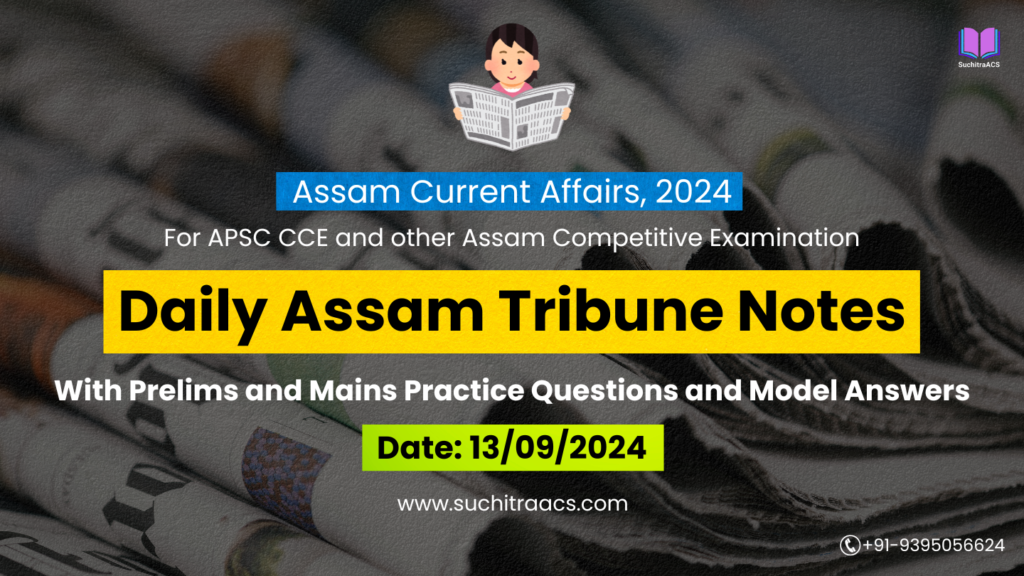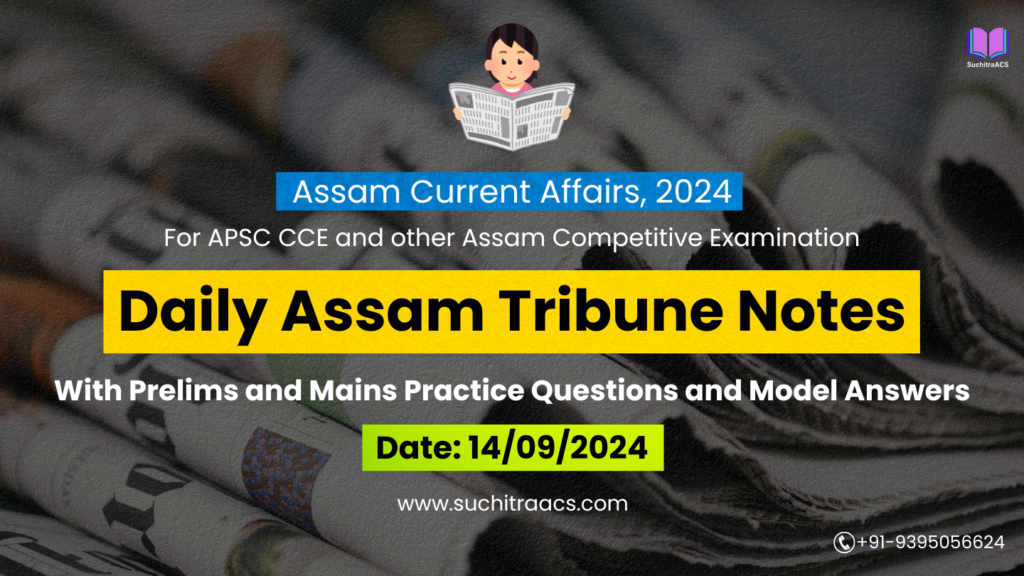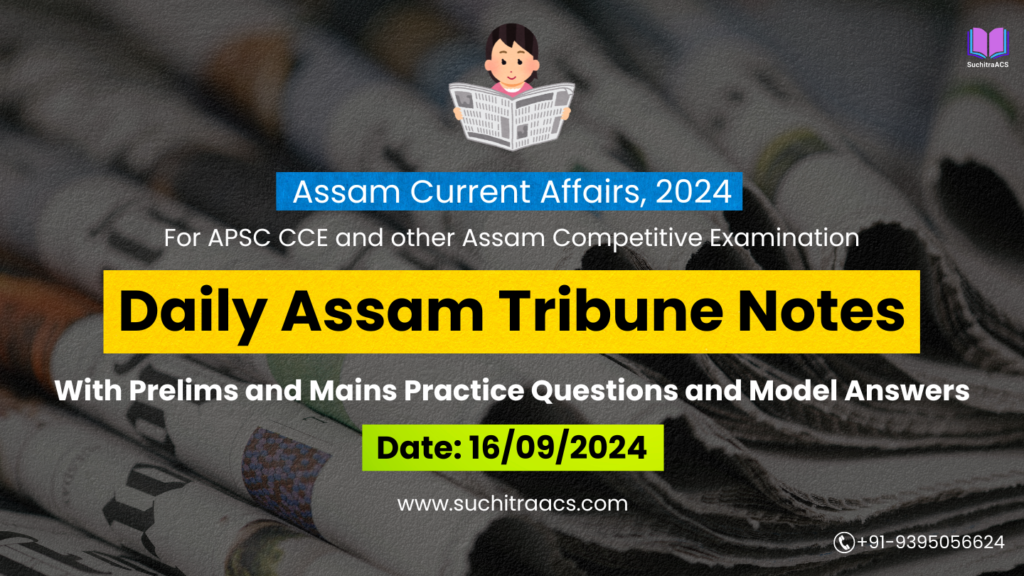APSC Current Affairs: Assam Tribune Notes with MCQs and Answer Writing (07/10/2024)
For APSC CCE and other Assam Competitive examinations aspirants, staying updated with current affairs is vital. This blog covers most important topics from the Assam Tribune today (07-10-2024). These issues are key for both APSC Prelims and Mains preparation, offering insights into the APSC CCE Syllabus.
1. Nijut Moina Scheme: Empowering Girl Students
GS Paper II – Governance, Social Justice
Introduction:
The Nijut Moina Scheme, launched by the Assam Government, provides financial assistance to girl students from higher secondary (HS) to postgraduate (PG) levels to encourage education and prevent child marriage. Chief Minister Himanta Biswa Sarma initiated the scheme to enhance the education of young girls and promote positive social outcomes.
Key Points:
- Financial Assistance:
- HS-level students will receive ₹10,000 per year.
- Graduate students will receive ₹12,500 annually.
- Postgraduate students are entitled to ₹25,000 per year.
- Coverage and Target:
- Aims to cover 10 lakh girl students across Assam in three years, with an annual outlay of ₹240 crore.
- Eligibility:
- Girl students must maintain regular attendance and good academic performance.
- The student must remain unmarried till the PG level to qualify for assistance.
Prelims Focus:
- Nijut Moina Scheme: Objectives, financial support levels, and eligibility criteria.
- Role of the scheme in preventing child marriage in Assam.
Mains Focus:
- Social Impact: The scheme’s potential to improve the educational participation of girls and reduce the school dropout rate.
- Challenges:
- Ensuring proper implementation across rural and remote areas.
- Preventing misuse or corruption in the distribution of funds.
- Long-term Outcomes: The scheme aims to promote gender equality in education and increase the number of educated women in Assam’s workforce.
Conclusion:
The Nijut Moina Scheme is a progressive step towards empowering girl students in Assam. By reducing the financial burden of education and incentivizing higher education, the scheme aims to prevent child marriage and promote social upliftment.
2. Assam’s Waste Management and Civic Challenges
GS Paper III – Environment, Urban Development
Introduction:
The NGO Save Guwahati, Build Guwahati (SGBG) has highlighted key civic issues in the city, especially concerning waste management, traffic congestion, and lack of scientific planning in infrastructure development.
Key Points:
- Waste Management:
- Guwahati faces inefficiency in daily waste collection and improper disposal.
- The city requires a scientifically planned waste disposal system to handle the growing volume of waste and prevent environmental hazards.
- Drainage and Flooding:
- Periodic construction of drainage systems has not resolved the issue of waterlogging and artificial flooding.
- Traffic Management:
- Traffic congestion is exacerbated by unauthorized parking, especially by auto-rickshaws.
- Despite multiple flyovers, the absence of well-developed lanes and bylanes continues to cause bottlenecks.
- Water Supply Issues:
- Delays in the completion of the Jal Board’s water supply project have affected the availability of clean drinking water in the city.
Prelims Focus:
- Key urban challenges in Guwahati related to waste management, drainage, and water supply.
- Importance of scientific urban planning in tackling urbanization issues.
Mains Focus:
- Urban Planning: The need for a comprehensive master plan for cities like Guwahati to manage rapid urbanization.
- Waste Management Solutions: Adopting scientific waste disposal systems and promoting recycling.
- Suggestions:
- Enhanced focus on green urban development, including tree plantation to counter the effects of the urban heat island.
- Public-private partnerships for efficient management of waste collection, disposal, and drainage systems.
Conclusion:
Addressing Guwahati’s civic issues requires coordinated efforts in urban planning, waste management, and infrastructure development. A sustainable approach to managing the city’s growth will not only improve living standards but also reduce environmental risks.
3. Assam’s Struggle with Water Supply under Jal Jeevan Mission
GS Paper II – Governance and Social Justice
Introduction:
The Jal Jeevan Mission (JJM) aims to provide functional household tap connections (FHTCs) to every rural household by 2024. However, Assam has been struggling to meet its targets due to infrastructure bottlenecks and project delays.
Key Points:
- Progress: As of now, Assam has provided FHTCs to 65.57% of rural households, which is below the national average. Challenges persist in connecting the remaining 30%.
- Quality Concerns: Even in areas where connections have been made, many taps do not provide continuous water supply, undermining the mission’s objective.
- Health Risks: Lack of access to safe drinking water has led to health issues like fluorosis and arsenicosis in several districts, including Nagaon and Sonitpur.
Prelims Focus:
- Jal Jeevan Mission (JJM): Key objectives and coverage in Assam.
- The impact of fluorosis and arsenicosis due to unsafe water supply.
Mains Focus:
- Governance Challenges: The need for better coordination between state agencies and contractors to ensure timely delivery of FHTCs.
- Sustainable Water Management: Importance of groundwater conservation and rainwater harvesting to address Assam’s water shortage.
- Suggestions:
- Streamlining project execution with clear deadlines.
- Investing in water conservation projects to ensure continuous supply.
Conclusion:
For Assam to achieve the goals of the Jal Jeevan Mission, there must be a focus on quality control, infrastructure development, and timely execution. Ensuring safe and adequate water supply is essential for the health and well-being of the population.
4. Challenges of the Transgender Community in Assam
GS Paper II – Social Justice, Governance
Introduction:
A district-level workshop in Dibrugarh, organized by the State Transgender Welfare Board, discussed the challenges faced by the transgender community in accessing livelihood opportunities and healthcare services. The event was attended by key stakeholders, including representatives from National Urban Livelihoods Mission (NULM) and National Health Mission (NHM).
Key Points:
- Discrimination and Exclusion:
- Transgender individuals face significant challenges, such as discrimination in public spaces and difficulty accessing basic services.
- Healthcare:
- The NHM pledged to establish a dedicated ward for transgender individuals in hospitals to improve their access to healthcare.
- Livelihood Opportunities:
- The District Industries Commerce Centre announced financial support to help transgender individuals start businesses and integrate into various economic sectors.
Prelims Focus:
- Transgender Welfare Board: Its role and objectives in Assam.
- Initiatives by NHM and NULM to promote healthcare and livelihood support for transgender individuals.
Mains Focus:
- Social Inclusion: How initiatives such as dedicated healthcare services and financial aid for livelihood opportunities can improve the quality of life for transgender individuals.
- Challenges:
- Social stigma and discrimination continue to hamper efforts for inclusivity.
- Limited access to government schemes due to lack of documentation or social barriers.
- Suggestions:
- Increase public awareness to reduce discrimination against transgender individuals.
- Ensure holistic support, including educational opportunities and skill development programs, to empower the transgender community.
Conclusion:
The workshop on transgender welfare reflects the growing recognition of the need for inclusive policies. By addressing the specific healthcare and livelihood challenges faced by the community, Assam can take significant steps towards greater social justice and equality.
5. Infrastructure Issues in Guwahati
GS Paper III – Urban Development, Governance
Introduction:
The NGO Save Guwahati, Build Guwahati (SGBG) has highlighted several key urban challenges in the city, such as inadequate waste management, traffic congestion, and the absence of proper planning in civic infrastructure development.
Key Points:
- Waste Management:
- The city struggles with an inefficient waste disposal system, leading to environmental concerns. There is a need for scientifically managed waste disposal.
- Traffic and Transport:
- Traffic congestion is severe due to poorly designed roads and unauthorized parking, despite the construction of several flyovers.
- Water Supply:
- The Guwahati Jal Board has failed to meet its deadlines, leading to inconsistent water supply across the city.
Prelims Focus:
- Issues of waste management in urban settings.
- Role of the Guwahati Jal Board in water supply infrastructure.
Mains Focus:
- Urban Planning and Management: The need for a comprehensive approach to managing urban challenges, especially in rapidly growing cities like Guwahati.
- Suggestions:
- Implement public-private partnerships for better waste management solutions.
- Adopt smart city technologies to reduce traffic congestion and improve public services.
- Challenges:
- Managing the fast pace of urbanization while ensuring sustainable development.
- Financial constraints in upgrading the city’s infrastructure.
Conclusion:
The urban challenges highlighted by SGBG reflect the urgent need for better governance and planning in Guwahati. A shift towards sustainable and efficient urban development practices can address these issues, improving the city’s livability and infrastructure.
APSC Prelims Practice Questions
1. Which of the following is NOT an objective of the Nijut Moina Scheme?
(a) To provide financial assistance to girl students from HS to PG levels
(b) To promote child marriage prevention in Assam
(c) To offer financial support for boys’ education in rural areas
(d) To increase educational participation of girls and reduce school dropout rates
Answer: (c) To offer financial support for boys’ education in rural areas
Explanation:
The Nijut Moina Scheme is aimed at girl students, providing financial assistance to prevent child marriage and promote education. It does not offer financial support for boys’ education.
2. Which of the following is NOT a key urban challenge faced by Guwahati as highlighted by the NGO Save Guwahati, Build Guwahati (SGBG)?
(a) Inefficient waste management
(b) Lack of public transport options
(c) Traffic congestion and unauthorized parking
(d) Waterlogging and artificial flooding
Answer: (b) Lack of public transport options
Explanation:
The key urban challenges highlighted by SGBG include inefficient waste management, traffic congestion, unauthorized parking, and waterlogging. Lack of public transport options is not specifically mentioned.
3. Which health condition has been linked to unsafe water supply in several districts of Assam, including Nagaon and Sonitpur?
(a) Tuberculosis
(b) Cholera
(c) Fluorosis and Arsenicosis
(d) Malaria
Answer: (c) Fluorosis and Arsenicosis
Explanation:
Fluorosis and arsenicosis have been identified as health risks due to unsafe water supply in districts like Nagaon and Sonitpur in Assam.
4. Which organization announced the establishment of a dedicated ward for transgender individuals in hospitals in Assam?
(a) National Urban Livelihoods Mission (NULM)
(b) National Health Mission (NHM)
(c) Assam Transgender Welfare Board
(d) District Industries Commerce Centre (DICC)
Answer: (b) National Health Mission (NHM)Explanation:
The National Health Mission (NHM) announced the establishment of a dedicated ward for transgender individuals in hospitals to improve their access to healthcare services.
APSC Mains Practice Question
Question:
Discuss the impact of the Nijut Moina Scheme on the education of girl students in Assam. What are the challenges in its implementation, and how can these be addressed?
(Answer in 250 words)
Model Answer:
Introduction:
The Nijut Moina Scheme, launched by the Assam Government, aims to provide financial assistance to girl students from higher secondary (HS) to postgraduate (PG) levels. This scheme seeks to encourage girls to pursue education, prevent child marriage, and promote social empowerment.
Impact on Education:
- Financial Support: The scheme offers ₹10,000 annually to HS students, ₹12,500 to graduate students, and ₹25,000 to PG students. This reduces the financial burden on families, encouraging them to prioritize education for their daughters.
- Prevention of Child Marriage: The scheme mandates that the beneficiary must remain unmarried until the PG level, contributing to the reduction of child marriage in the state.
- Increase in Enrollment: By financially supporting girl students, the scheme increases enrollment rates at the higher education level, particularly for those from underprivileged backgrounds.
- Gender Equality: It promotes gender equality by empowering young women to become economically independent and educated, enhancing their opportunities in the workforce.
Challenges:
- Implementation in Remote Areas: Ensuring smooth implementation in rural and remote areas, where access to education and monitoring mechanisms may be limited.
- Misuse of Funds: There is a risk of corruption and misuse of funds during disbursement.
- Awareness: Many eligible families may not be aware of the scheme’s benefits or face challenges in completing the necessary documentation.
Suggestions:
- Strengthening Awareness Campaigns: Launch awareness programs in rural areas to ensure families are informed about the scheme.
- Efficient Monitoring: Implement a robust monitoring system to track the beneficiaries and ensure transparency in fund distribution.
- Partnerships with Local NGOs: Partner with local NGOs to help with outreach, ensuring the scheme reaches the most marginalized communities.
Conclusion:
The Nijut Moina Scheme has the potential to transform the educational landscape for girls in Assam. By addressing challenges in implementation and ensuring broad outreach, it can significantly contribute to gender equality and social upliftment in the state.
✨ Looking for top-quality APSC online coaching at an affordable price?

🔔 Join Our WhatsApp Study Group!
For exclusive access to premium quality content, including study materials, current affairs, MCQs, and model answers for APSC CCE and other Assam competitive exams.
Click here to join: SuchitraACS Study WhatsApp Group
📚 Want to know more about SuchitraACS’s most affordable courses?
Click here to know more: SuchitraACS Courses for APSC CCE and Assam Competitive Examinations




